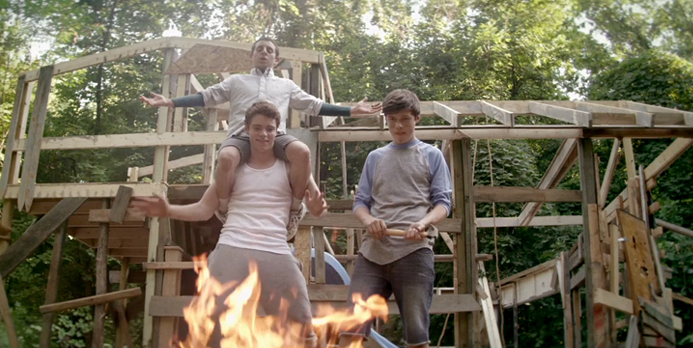Director/ Writer: Jason Reitman
Starring: Kate Winslet, Josh Brolin, Gattlin Griffith, Clark Gregg,
James Van Der Beek, Alexie Gilmore
Synopsis: Adele (Winslet) is a divorced, depressed mother. Her son
Henry (Griffith) sees to her every need and keeps her life as pleasant as it
can be. On a normal day of shopping a man (Brolin) approaches them, asking to
be looked after. His name is Frank and he’s an escaped convict; he needs a
place to hide and Adele’s house seems the perfect fit. As he holds them up in
their own home they slowly become to see him as a gentle, kind man whose
convictions may not be as truthful as the courts have claimed.
Jason Reitman – director of Thank You for Smoking, Up in the Air, Juno and Young Adult – is
an auteur of sardonic, caustic comedy dramas. He’s done well up till now
establishing himself as a storyteller of a certain kind. Nevertheless, like
most directors and/or writers, he doesn’t want to get fenced in by his own style.
This brings us to his latest – Labour Day
– a film about sadness, criminality and the absence of light.
The house in which we spend most
of the film may be quite shaded, though the heat felt from the far-flung sun is
palpable. Heat batters the actors – shimmering with sweat as if they were in a Tennessee
Williams play. It’s atmospheric, with an ambience effortlessly detected.
Continuing on from the Williams
comparison, Josh Brolin as the mysterious, muscular Frank honours the memory of
Marlon Brando, Paul Newman and James Dean by recapturing their qualities on
screen. Brolin is one of American’s finest actors working today, with Labor Day promoting his natural movie-star
appeal.
Mentioning the film, you cannot
forget Gattlin Griffith, the star of the film and our eyes to the story.
Griffith plays the son of Adele, a kind boy who understands his mother’s upset,
and aims to make her life better. The introduction to Frank disrupts this ideal
initially but it soon becomes clear, introducing Frank to Adele further helps
her in life (somewhat). Griffith has penetrating eyes, wise and expressive. We
are influenced by his perspective; a perspective that is unprejudiced and
innocent. When fear is felt, there is the notion of safety taken from Henry’s
level-headedness. Reitman couldn’t have asked for a better child actor –
unassailably adept at acting.
Winslet, as the shared support
(lead billing should go to Gattlin Griffith) continues to impress, choosing
this quiet role against something more substantial. It’s a choice that plays to
her advantage, and her subtle style here highlights her range more than
previous work has. Clenching through the first half, relaxing in the middle and
shaking near the end, it’s a very physical performance, in tune with Reitman’s
suggestive style.
The dialogue and story will, for
some, be too ridiculous. Those able to accept the story of a kidnapped woman
falling for her fugitive incarcerator will find an appeal in the way the story
is handled. Reitman keeps the pace at a shuffling speed, trying not to hurry
the growth of the relationships. It works like a modern day Nicolas Ray or
Douglas Sirk picture, where messages and events are implied more than they are
introduced. As much as you feel the sticky, warm air, you get the sense of lust
and caution from carefully storyboarded shots. Humorous as some can be (a
pie-making scene attempting to imply sex but rather explicit for a contemporary
audiences’ understanding), Reitman is meticulous in his orchestration of
lighting, editing and camera movement. He has made more enjoyable films (such
as Thank You for Smoking and Up in the Air), but this is his best
work as a director. If you cannot enjoy the movie on an entertainment level,
you can peruse its framing with great admiration. Reitman hones his skills well
for Labor Day, with only the missteps
of a superfluous 15 minutes in his screenplay and some choppy structuring
concerning flashbacks.
With a surrounding cast that
expands on the impression of a small community, the close-knit environment
stresses a strain. Even in the wooden, rigid setting of Adele and Henry’s
house, the reminder of the outside world never feels like an escape. Once Frank
enters the house, the external starts to feel intrusive, and we don’t want to
leave the internal security of the house. Extending to the flashbacks that take
us out and away from the time period (focusing on a young Frank, played by his
youthful doppelganger, Tom Lipinski), the secure spot of the house is all we
need. How Reitman enables this empathy with Frank, and the fabrication of the domestic
he impinges on, is mesmerizing.
A film that will divide audiences
and critics alike, Labour Day is an
almost fairytale crime drama. It works on a number of levels, those of which
may be detested by some. As a work of art (in filmic terms) it has a lot of
depth and beauty. Flawed by some accounts, it’s still masterful as sensation
cinema – to be felt and digested wistfully.
****
Also posted on LiveForFilms


















